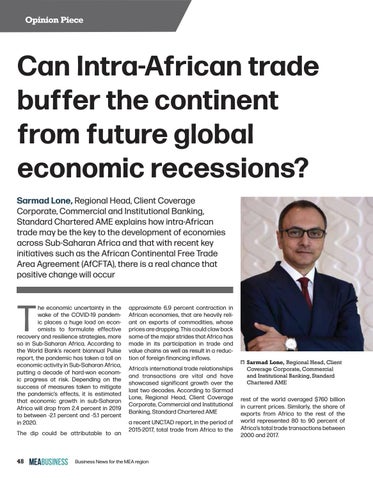Opinion Piece
Can Intra-African trade buffer the continent from future global economic recessions? Sarmad Lone, Regional Head, Client Coverage Corporate, Commercial and Institutional Banking, Standard Chartered AME explains how intra-African trade may be the key to the development of economies across Sub-Saharan Africa and that with recent key initiatives such as the African Continental Free Trade Area Agreement (AfCFTA), there is a real chance that positive change will occur
T
he economic uncertainty in the wake of the COVID-19 pandemic places a huge load on economists to formulate effective recovery and resilience strategies, more so in Sub-Saharan Africa. According to the World Bank’s recent biannual Pulse report, the pandemic has taken a toll on economic activity in Sub-Saharan Africa, putting a decade of hard-won economic progress at risk. Depending on the success of measures taken to mitigate the pandemic’s effects, it is estimated that economic growth in sub-Saharan Africa will drop from 2.4 percent in 2019 to between -2.1 percent and -5.1 percent in 2020. The dip could be attributable to an
48
MEABUSINESS
approximate 6.9 percent contraction in African economies, that are heavily reliant on exports of commodities, whose prices are dropping. This could claw back some of the major strides that Africa has made in its participation in trade and value chains as well as result in a reduction of foreign financing inflows. Africa’s international trade relationships and transactions are vital and have showcased significant growth over the last two decades. According to Sarmad Lone, Regional Head, Client Coverage Corporate, Commercial and Institutional Banking, Standard Chartered AME a recent UNCTAD report, in the period of 2015-2017, total trade from Africa to the
Business News for the MEA region
S armad Lone, Regional Head, Client Coverage Corporate, Commercial and Institutional Banking, Standard Chartered AME
rest of the world averaged $760 billion in current prices. Similarly, the share of exports from Africa to the rest of the world represented 80 to 90 percent of Africa’s total trade transactions between 2000 and 2017.























